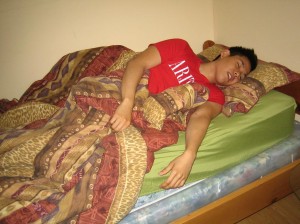Restless leg syndrome is a condition with uneasy feelings in the legs that cause the affected person to move around. There is also burning and tingling sensations, twitching and aching in the legs and also in the arms. Restless leg syndrome can start at any age and becomes worse as the individual ages.
A severe case of restless leg syndrome can cause fatigue, deprivation of sleep and exhaustion and the symptoms are not always painful. Uncontrolled sensations in the legs causes the person to respond uncontrollably such as shaking the legs, shifting, standing or even other movements just to minimize the sensations. Restless leg syndrome can cause irritation and painful as well as becoming severe especially when lying down or trying to relax.
Symptoms
- Sensations after lying down or sitting for long hours such as in a car, movie theater and an airplane.
- Minimize the sensations of restless leg syndrome with certain movements such as jiggling and stretching the legs, pacing or walking.
- Symptoms becomes worse during night time

Sensations of restless leg syndrome can be minimized with certain movements such as jiggling and stretching the legs, pacing or walking. - Restless leg syndrome can be due to another condition or periodic limb movement where the legs kick and twitch throughout the night while sleeping.
Causes
- Restless leg syndrome can be due to heredity or a family history of the syndrome.
- Side effects of pregnancy usually in the last trimester and it can also be caused by changing hormones, muscle strain, shifting weight and insufficient nutrients in the body and eventually disappears after giving birth.
- Using medications used in managing nausea and seizures while medications for allergies and common cold can make the condition worse.
- Low level of iron in the body and anemia can also cause restless leg syndrome.
- Caffeine and alcohol makes the condition worse
Treatment of restless leg syndrome
- Take a hot bath and massage the legs before sleeping at night in order to help relax the legs.
- Before going to bed, stretch the legs at least 10-15 minutes to prevent cramping of the legs at night.
- Place a pillow between the legs when going to sleep at night and lay either on the right or left of the body. Avoid lying on the back in order to prevent restless leg syndrome
- Perform relaxation activity such as yoga, meditation, muscle relaxation and listening to relaxing music. These help minimize stress that can cause irritability, anxiety and making the condition worse.
- Apply hot and cold compress on the affected area in order to help minimize tingling and burning sensations in the legs.
- Avoid caffeine, tobacco and alcohol in order to prevent the condition from getting worse.
- Maintain a regular schedule of going to sleep and waking up at the same time every day to lessen the symptoms. Sleep in a cool, quiet and comfortable sleeping environment.
- Perform moderate regular exercises to lessen the symptoms. In addition, avoid overdoing or working out too late in the day to minimize the symptoms.
- Take calcium and zinc supplements before going to bed to help minimize muscles from cramping.
FACT CHECK
https://www.webmd.com/brain/restless-legs-syndrome/restless-legs-syndrome-rls#1
https://www.mayoclinic.org/diseases-conditions/restless-legs-syndrome/symptoms-causes/syc-20377168
